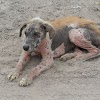Presented by: Manoj karki (BVSC&AH)
Eczema in dog
Eczema is an allergic reaction or we can say allergic dermatitis occur as a result of various allergens either exogenous or endogenous. It is a superficial skin inflammation which may be produce by various external and internal substances against which cells are senitized, but it always involves a special local or general predisposition. There are several manifestation of eczema like vesicle formation, oozing watery discharge and development of scale and crusts.
Cause:
Eczema occur when the sensitized skin cell are brought into contact with allergens.
1. Food allergens, viz: vegetables, meat, eggs, milk, rice, tomato, and may be due to other foods also.
2. Protozoan allergens: via, leishmaniasis
3. Bacterial allergens: via, tuberculosis, leptospirosis
4. Viral allergens: via, exanthematous form of distemper
5. Fungal allergens: via, trichophytosis
6. Helminthic allergens: via, ascarisis, hookworm, tapeworm, whipworm
7. Allergic skin condition caused by sera, vaccine and other protein substances.
Beside the above allergen there are a few drugs, viz, potassium iodine and bromide and phenothiazine that may also cause allergic response.
Exogenous allergens:
1. External parasite like fleas and lice
2. Antiseptic and disinfectant washes
3. Miscellaneous painted floors, bedding material, rubber balls, dyes, pollen grains etc. sometimes it may be due to mixed allergens or uncertain etiology.
Predisposing cause:
Inherited susceptibility, hepatic disorder, hormonal imbalance, heat , cold , light, etc..
Pathogenesis:
Antigen and antibody reaction produces a antigen- antibody complex which cause degranulation of cells responsible for releasing pharmacologically active amines like 5HT, histamine, bradykinin, prostaglandin, etc.. these active amines caused sensitization reaction in the affected cells leading to the allergic manifestation in skin, viz erythema, pruritis, and oedema.
Clinical signs;
Through eczema present complex and varied clinical picture but it always takes the form of a superficial skin change. Initially these will be appearance of a small reddish spot. Sometimes papule or inflammatory vesicle of varying size are present. At the same time there will be swelling either diffuse edema or localized urticarial edema of the superficial layers of the skin. according to the duration of the disease it may be acute or chronic and according to the nature of the eczema. It may be dry or moist. In most case there may be exudation of serum and pus, and in chronic case lesion may become dry, thickened and hyperkeratosis along with constant pruritis.
Diagnosis:
It is difficult to make a definite diagnosis of eczema because differentiation between it and dermatitis make problem. In eczema lesion are superficial and recur when the skin is exposed to the same or other sensitizing substances.
Treatment:
1. The first step in treating an eczema is removal of the causative agent.
2. The diet must be readily digestible and should have all the vitamin and mineral in an adequate level.
3. Meat and egg restricted diet help in early recovery
4. Milk/vegetable soup or liquid diet is more favorable for patient
5. For the suppression of action of histamine, antihistamine should be given
6. Steroid are also helpful in symptomatic relief of the allergic dermatitis.
7. Antibiotic should be used to prevent secondary bacterial infection.








1 Comments
thank u bigyan khadka
ReplyDelete